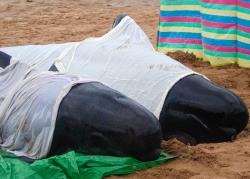Whale rescuers at Durness did all they could, says Audrey Gunn
Register for free to read more of the latest local news. It's easy and will only take a moment.
RESCUERS "gave everything they had" to try to save the whales stranded at Kyle of Durness, according to a local woman involved in the bid to keep them alive.
Audrey Gunn, who is a trained British Divers Marine Life Rescue medic and a local SSPCA senior inspector, yesterday spoke about "the tremendous effort" that was made to try and save more than 60 cetaceans over the weekend.
The efforts ensured that 45 of the long-finned pilot whales, who got into difficulties after getting caught in low tide, were guided back to deep water. But 16 died.
"We were disappointed that they could not all be saved but were delighted that 45 were rescued," Ms Gunn told the Caithness Courier. "Everyone involved put in a tremendous effort and long hours to help the whales and they deserve credit for what they did," she said.
Around 60 people were involved in the rescue and came from various parts of the
country.
Ms Gunn was contacted about noon on Friday and arrived at the scene in under two hours.
There were two groups of whales in trouble – one small pod and a bigger one.
Divers, assisted by boats, tried to herd them away from the shore and to the safety of deeper water. Four whales, including a mother and calf and adults, were stranded on a sand bank.
While attempts were made to rescue them it was decided to try and get the two groups together and put them back out to sea.
Most of whales made it back to the deeper water but 16 died despite the efforts of the volunteers from the BDMLR, the Whale and Dolphin Conservation Society, the Maritime and Coastguard Agency, divers from the military base at Cape Wrath, members of the public and holidaymakers.
"There was an amazing response. People came from Inverness, Elgin, the south of Scotland and England to help out," said Ms Gunn, who assisted in monitoring the whales’ breathing, helped keep them moist and ensured their blowholes were upright.
Meanwhile, the Highland Council’s environmental health service arranged for the prompt burial of the 16 carcasses at a remote location at the south end of the Kyle of Durness, to ensure there were no nuisance or public health issues.
The site was identified in consultation with the Scottish Environment Protection Agency and the local landowner. The burials started on Monday after government vets carried out postmortems on many of the whales to establish their condition and to identify any possible causes for the strandings.
SAC’s veterinary investigations officer, Dr Andrew Brownlow, who carried out postmortems on all 16 whales, said: "One possible explanation is that they were spooked by something further out to sea.
"This could include underwater noise such as an earthquakes or an explosion but we are continuing to investigate and have not reached a definitive conclusion as yet."







